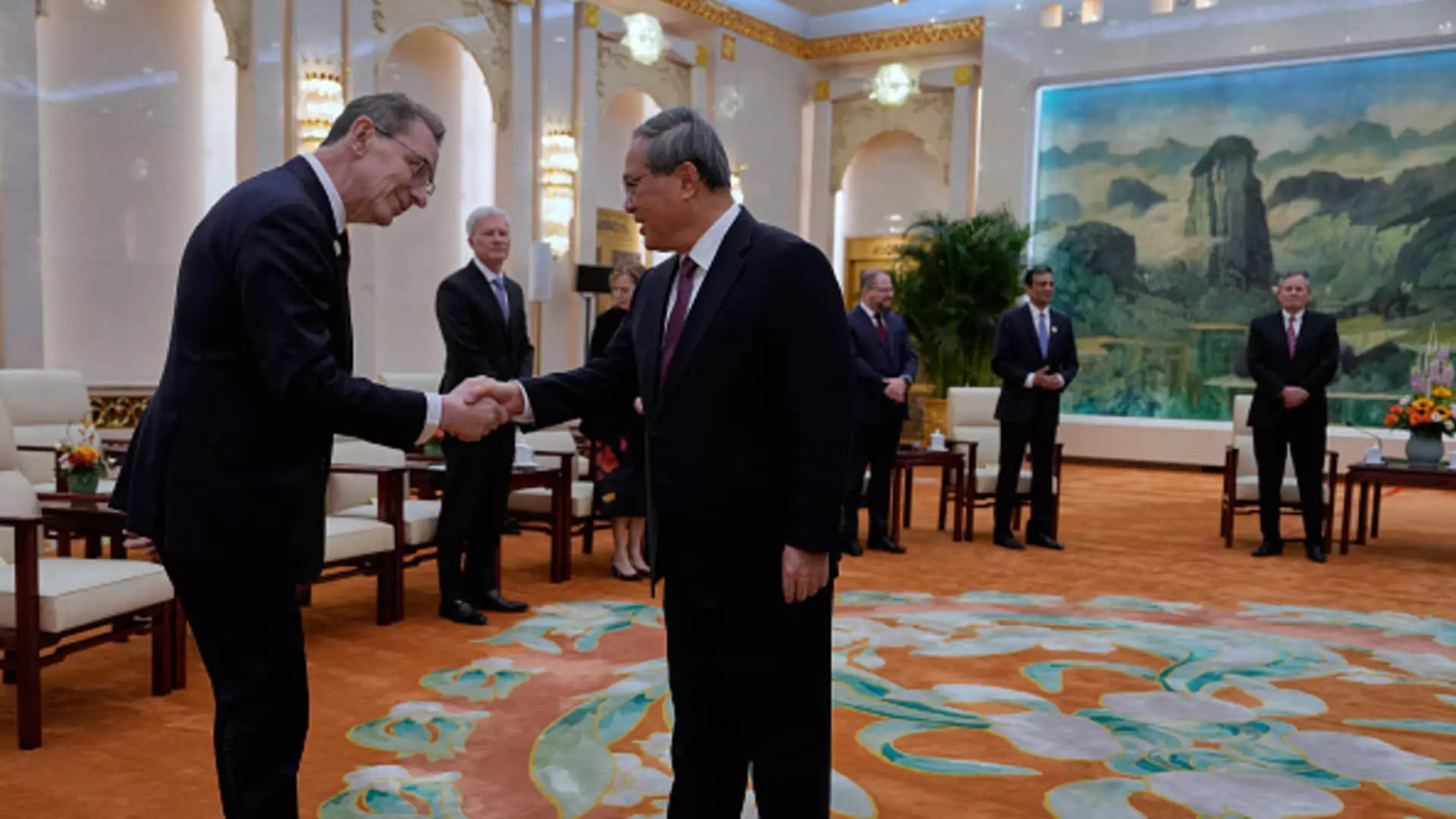The recent visit of U.S. Republican Senator Steve Daines to Beijing is a stark reminder of the complexities surrounding U.S.-China relations in a world where political dynamics shift with rapid unpredictability and urgency. Accompanied by a high-profile roster of American executives from companies like Qualcomm and Pfizer, this meeting represents a cautiously optimistic step towards fostering dialogue at a time when tensions are palpable. The nuance of this trip cannot be overstated; it signals an intention to mend ties that have frayed considerably, particularly under the previous administration’s punitive tariffs and confrontational stance.
Daines’ trip unfolds as the first for a U.S. politician since Trump’s presidency began, raising eyebrows and questions about the current administration’s approach to global diplomacy. Here lies a fundamental conflict: while Daines epitomizes the business-savvy politician willing to engage with China, he’s also tethered to a faction that has historically fostered animosity and isolation. The tension between pragmatism—represented by Daines—and hardline rhetoric from both Trump and others in his faction encapsulates a broader ideological rift.
Corporate America Needs China
The undeniable reality is that U.S. corporations require access to China’s vast market to thrive. Daines’ meeting emphasized this need when he highlighted the extensive history of American companies operating within China, collectively possessing what he termed “over 275 years of experience.” It’s a loud call to Washington: preserving this economic link is crucial for enhancing American business interests in an increasingly globalized economy. However, the irony drips from every word; while corporations advocate for engagement, their voices are often overpowered by nationalistic rhetoric clamoring for economic warfare.
This paradox illustrates the growing disconnection between the economic realities that businesses face and the political posturing that dominates narratives around China. The message from Beijing—seeking high-level dialogue to cushion the pressures of U.S. tariffs—reflects its own urgency. The Chinese government’s overtures denote recognition that continued economic growth necessitates collaboration, not just competition. While politicians debate grand policies, the businesses desperately require stability and predictability, showcasing a bitter truth: those with the most at stake are often sidelined in political disputes.
Fentanyl Precursor: A Growing Concern
During the meetings, the candid discussion about fentanyl precursors revealed a significant point of contention. Daines reiterated the urgent need for China to take proactive measures against the flow of these harmful substances into the U.S. His stance underscores a crucial intersection of domestic health crisis and foreign policy, but the dialogue can also be viewed as symbolic—merely addressing symptoms without confronting the deeper ailments of bilateral relations.
The flow of fentanyl has become a flashpoint, allowing political figures on both sides to leverage the issue to galvanize their respective bases. Yet, it’s imperative to ask whether this issue would still evoke such urgency had it not been politicized. In this context, achieving a delicate balance between aggressive negotiations and the necessity of soft diplomacy becomes paramount. Daines’ appeal for further high-level talks does not merely signify a desire for stability in trade; it reveals the increasing interdependence of health security and economic prosperity in the modern geopolitical theater.
A Quest for Pragmatism
Li Qiang’s encouragement of dialogue over confrontation resonated throughout the meetings, encapsulating a call for pragmatic engagement in a landscape rife with antagonism. As the political landscape continues to oscillate, this sentiment serves as a reminder: at the core of international relations lies the potential for mutual benefit, even amid deep-seated distrust. Both sides of the Pacific must acknowledge that zero-sum approaches yield nothing but further division.
Daines’ interactions and subsequent social media sentiments underscore a transformative moment; he personifies the potential for bipartisanship that transcends isolationist ideologies. The complexities of U.S.-China ties demand a recalibration—more soft notes of collaboration rather than the sharp barbs of economic sanctions. As CEOs and politicians navigate these waters, they must prioritize strategic engagement over divisive posturing.
The journey forward remains fraught with challenges, but Daines’ trip illustrates a necessary step of bridging the ever-widening chasm. Both nations stand at a pivotal juncture with the potential to redefine their partnership, embodying the essence of modern diplomacy where pragmatic dialogue reigns supreme over ideological divides.


Leave a Reply